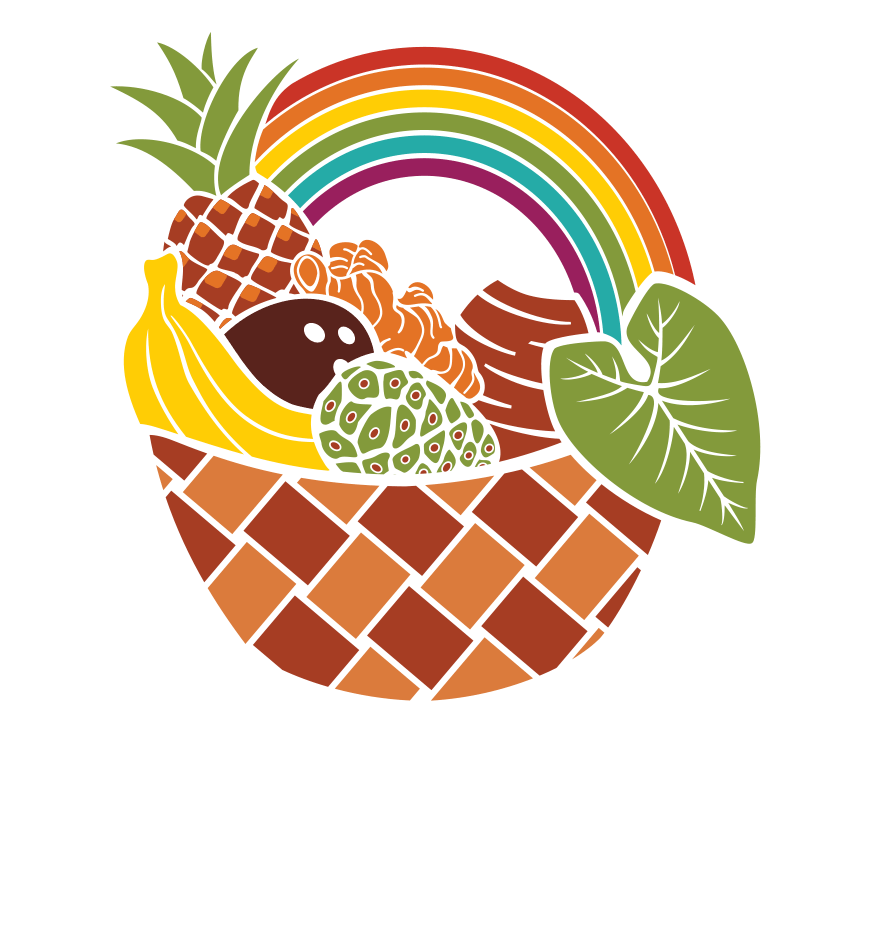The Food Basket’s DA BUX Program Prioritizes Nutrition Education for Keiki
USDA’s At The Table, Western Region Newsletter
Submitted by Leelen Park, Deputy Director of Healthy Food Access Initiatives, The Food Basket, Hawaiʻi Island's Food Bank
Through the release of the Kai and Hōkū Explore Foods of Hawaiʻi book in September 2021, The Food Basket-Hawai‘i Island’s Food Bank took its first stride in creating place-based nutrition education resources for Hawaiʻi’s keiki (the Hawaiian word for children). The book was launched as a teaching tool to help families and early childcare providers explore local fruits and vegetables with their children. It features the popular mascots, Kai and Hōkū, of the Keiki Heroes public health initiative as they learn about eight crops commonly grown in the Hawaiʻi, including ‘ulu (breadfruit) and kāpiki pākē (bok choy). The book offers hands-on learning activities and simple recipes, making each fruit and vegetable an exciting adventure and valuable learning experience for young food explorers.
Kai and Hōkū Explore Foods of Hawaiʻi was authored by Tiana Kamen, creator of Farm to Keiki teaching resouces, and Dr. Koh Ming Wei, Executive Director of Center for Getting Things Started. Over 2,200 hard copies of the book have been distributed throughout the Aloha State to various pre-k schools and organizations, not including the free PDFs downloaded directly from www.dabux.org/keiki-corner. With the continued partnership of Ms. Kamen and Dr. Ming Wei, The Food Basket is now in the planning stages to launch a year-long Family Program in the fall of this year at no cost to 700 families. The Family Program will provide each of the families two new books featuring crops of the two Hawaiian seasons, a food literacy education toolkit, and four virtual family workshops. The workshops will guide families in one or more of the activities and recipes that will be found in the new books, and all recodings of the workshops will be made available online for keiki educators to use as a resource.
These keiki nutrition education efforts are an integral service of The Food Basket’s DA BUX Double Up Food Bucks program (also known as “DA BUX”), a statewide program working to increase the purchase and consumption of Hawaiʻi -grown fruits and vegetables by low-income recipients of the Supplemental Nutrition Assistance Program (SNAP). When SNAP shoppers use their federal food benefits to purchase qualifying local produce at participating DA BUX food retailers they receive a 50% discount. DA BUX subsidizes their purchases with funding that comes primarily from the USDA Gus Schumacher Nutrition Incentive Program. By getting children and their families excited about eating more local fruits and vegetables, The Food Basket aims to increase participation in the DA BUX program and ultimately address alarming health concerns in the state.
According to the Centers for Disease Control and Prevention, obesity prevalence of Hawaiʻi children aged 2-4 participating in the Special Supplemental Nutrition Program for Women, Infants and Children (WIC) program was reported at almost 11% in 2018. Given that the COVID-19 pandemic has likely exacerbated this rate, it is critical to educate keiki and their families on making healthy choices. “The reason the [Family Program] is important is that it encourages and teaches children (and their families) to eat what is in season, thus making them more food and nutrition secure,” states Dr. Koh Ming Wei. The Food Basket’s Executive Director, Kristin Frost Albrecht expands on this sentiment: “If this pandemic has taught us anything, it is that we need to continue to improve our food security as a way to better navigate future disasters in Hawaiʻi. What better way to do so, than by teaching our keiki how to grow, prepare, and eat healthy, locally-produced foods and limit our reliance on less nutritious options that travel long distances from the continent or elsewhere.”

